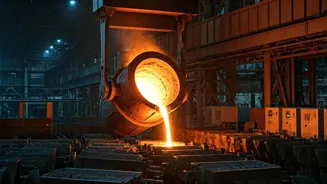AI's Value Proposition
The Indian steel industry is presently in a phase of enthusiastic adoption of artificial intelligence (AI) technologies. This strategic integration isn't
merely a technological upgrade; it's a comprehensive effort aimed at improving efficiency and boosting profitability across the entire value chain. The primary areas of AI implementation include optimizing production processes, predictive maintenance of equipment, and enhancing supply chain management. By utilizing AI, steel companies can analyze vast amounts of data to identify patterns, predict potential problems, and make real-time decisions. For instance, AI algorithms can fine-tune furnace operations to reduce energy consumption and minimize waste, supporting a greener transition. Predictive maintenance, driven by AI, helps reduce downtime and minimizes operational costs by detecting potential equipment failures before they occur, optimizing operational efficiency. Consequently, the steel industry stands to gain significant benefits by leveraging AI to refine their operations and achieve substantial cost savings, improve productivity, and contribute towards a more sustainable future, all while enhancing its economic position in the global market.
Greener Transition Fuels
A significant focus within the Indian steel industry is the incorporation of AI to enable and speed up the shift towards more environmentally friendly practices. This commitment is reflected in the adoption of AI-driven solutions aimed at cutting carbon emissions, decreasing energy consumption, and promoting the adoption of renewable energy sources. AI aids in identifying areas where energy use can be optimized, allowing steel manufacturers to make operational adjustments that reduce their environmental footprint. AI-powered systems can track and manage energy consumption, helping companies to monitor their carbon emissions more effectively. The integration of AI extends to supply chain management, optimizing transportation routes and reducing the carbon emissions associated with logistics. Moreover, AI plays a crucial role in promoting the adoption of sustainable materials and processes by analyzing data to make informed decisions on material selection. This shift is not only beneficial for the environment but also helps Indian steel firms meet regulatory compliance and global sustainability standards, enhancing their competitiveness in the international market. As the industry embraces green initiatives, AI is an essential tool in achieving these objectives, driving both environmental benefits and operational improvements.
Financial Green Boost
The implementation of AI in the Indian steel industry is intrinsically linked to securing financing for green initiatives, as the focus shifts to sustainable operational methods. Financial institutions are increasingly considering environmental factors in their lending decisions, and the adoption of AI helps steel companies fulfill these requirements. By utilizing AI to reduce emissions, conserve energy, and improve resource efficiency, steel firms can make a strong case for financial support for their green projects. AI facilitates precise tracking and reporting of environmental impact, giving financial institutions the data required to assess the sustainability of projects. This transparency and data-driven approach can lead to favorable interest rates and more accessible funding options for sustainable initiatives. Furthermore, AI enables improved risk management, decreasing the financial risk of investment in green projects. Consequently, AI integration not only aids the steel industry in transitioning toward sustainability but also streamlines the process of securing the financial resources required to make this transition a reality. The increased availability of finance, in turn, accelerates the adoption of green technologies and fuels the ongoing transformation of the steel sector in India.
Supply Chain Optimization
The steel industry in India is seeing substantial improvements in supply chain management by leveraging AI, which leads to greater efficiency and responsiveness. AI-powered tools are being employed to analyze vast datasets, forecast demand, and improve inventory management. This helps companies streamline their logistics, reduce costs, and improve customer satisfaction. By forecasting demand more accurately, steel producers can optimize their inventory levels, reducing the likelihood of overstocking or shortages. AI algorithms also assess and optimize shipping routes, minimizing transportation costs and lead times. Furthermore, AI supports supplier management by assessing the performance of suppliers and evaluating their sustainability efforts. AI also helps companies adapt quickly to market changes and mitigate risks like disruptions in supply. The integration of AI in supply chain management ensures that steel products are delivered efficiently, meeting customer needs promptly while enhancing operational efficiency. This also leads to increased competitiveness in the market as well as the promotion of more sustainable practices.
Future Outlook: AI's Role
As India's steel industry continues to develop, artificial intelligence is poised to play an ever-increasing role. Companies are looking at more advanced uses for AI, including automating more processes, improving the accuracy of data analysis, and establishing even more effective decision-making strategies. There's also a move toward employing AI to foster greater collaboration across the value chain. This could involve integrating AI systems across several businesses to share information and optimize processes. The future envisions advanced AI-driven systems that not only improve operations but also drive innovation in areas such as sustainable materials and smart manufacturing. Continued investments in AI research and development, coupled with training and upskilling initiatives, will be key to realizing AI's full potential in the steel sector. As AI technologies evolve, they are anticipated to provide even more opportunities for growth and improvement in the Indian steel industry, making it more competitive and sustainable in the years to come.















